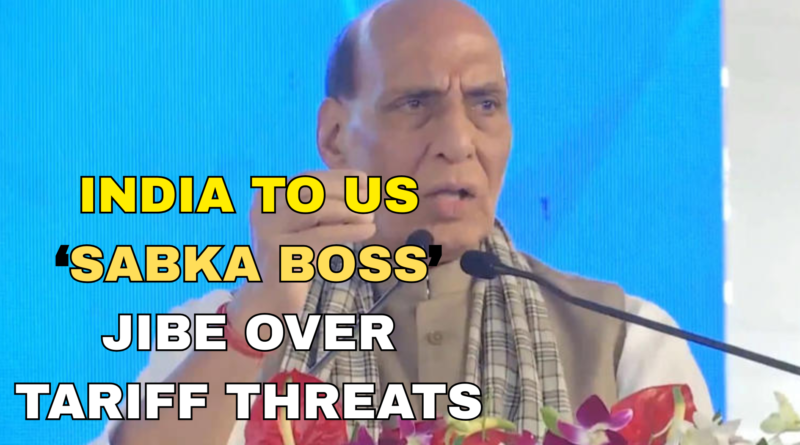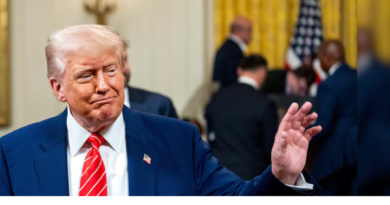INDIA TO US: ‘SABKA BOSS’ JIBE OVER TARIFF THREATS
In a statement that has reverberated across diplomatic and media circles, India’s Defense Minister Rajnath Singh has taken an unusually sharp public swipe at the United States over its tariff threats. While speaking at a public event in New Delhi, Singh made a tongue-in-cheek remark, referring to the U.S. as the “Sabka boss” a phrase in Hindi meaning “everyone’s boss” and hinting that Washington’s discomfort stems from India’s rapid ascent on the world stage.
The comment came amid renewed tensions over Washington’s consideration of higher tariffs on certain Indian goods, citing trade imbalances and market access issues. Singh’s lighthearted yet cutting quip was interpreted by many as a subtle assertion of India’s sovereign stance and a reminder that the country is no longer content to play second fiddle in global affairs.
Tariffs as a Pressure Tool
The U.S., under successive administrations, has frequently wielded tariffs as a lever to influence trade partners’ policies. While these measures are often justified on economic grounds, critics argue they are increasingly being used as geopolitical bargaining chips. India has found itself in Washington’s sights on multiple occasions, particularly over agricultural imports, pharmaceutical exports, and digital commerce regulations that challenge the dominance of U.S. tech giants.
This latest flare-up stems from reports that the U.S. Trade Representative’s office is considering imposing higher duties on Indian steel, aluminum, and select manufactured goods, ostensibly to “protect American industries.” New Delhi, however, sees the move as inconsistent with the spirit of the strategic partnership the two nations have cultivated over the past two decades.
Singh’s Statement: Humor with an Edge
Rajnath Singh’s “Sabka boss” remark was delivered with a smile, but its undertone carried a pointed message. In effect, Singh suggested that while the U.S. may be accustomed to calling the shots globally, it is now contending with an India that is not only willing to push back but also capable of charting its own path.
Political analysts say the quip reflects a growing confidence within India’s leadership. “It was a calculated bit of political theater,” said Dr. Meera Chatterjee, a foreign policy expert at Jawaharlal Nehru University. “Humor can be a powerful diplomatic tool it softens the blow while making the message impossible to miss.”
Economic Stakes and Strategic Realities
India and the U.S. share over $190 billion in annual bilateral trade, with both sides benefiting from the relationship. India is a major exporter of pharmaceuticals, IT services, and textiles to the U.S., while importing defense equipment, energy products, and advanced technology. Tariffs, however, can quickly sour this relationship, raising costs for consumers and businesses on both sides.
For India, the challenge is balancing its need for strong economic ties with the U.S. against its desire for strategic autonomy. The country’s rise as a manufacturing hub, along with initiatives like “Make in India,” has positioned it as a competitor in sectors where American firms traditionally hold sway.
A Wider Geopolitical Context
Singh’s remark also comes at a time when global geopolitics is undergoing significant shifts. Washington is increasingly reliant on India as a counterweight to China in the Indo-Pacific, while New Delhi is carefully managing its relationships with multiple power centers from the U.S. and Europe to Russia and the Global South.
In this context, overt U.S. tariff threats can be seen as counterproductive, undermining the trust required for deeper defense and technology cooperation. As one senior Indian diplomat put it off the record, “You can’t court India as a strategic partner with one hand and slap tariffs with the other.”
Public Reception and Media Frenzy
In India, Singh’s “Sabka boss” quip has been widely shared on social media, with many netizens praising it as a bold and witty retort. Hashtags like #SabkaBoss and #RajnathSingh trended on X (formerly Twitter), with users debating whether such humor strengthens India’s bargaining position or risks escalating tensions.
In U.S. media, coverage has been more restrained but nonetheless pointed, framing Singh’s words as a sign of India’s growing assertiveness and unwillingness to simply acquiesce to American demands.
What’s Next?
Trade talks between India and the U.S. are ongoing, with negotiators expected to meet in the coming weeks to address tariff concerns. While Singh’s remark has added an element of public theater to the dispute, experts believe both sides have strong incentives to find common ground.
Still, the episode serves as a reminder that the India-U.S. relationship, while robust, is not immune to friction. In a multipolar world, even the “Sabka boss” must adjust to the reality that rising powers like India are ready and willing to speak their minds.




